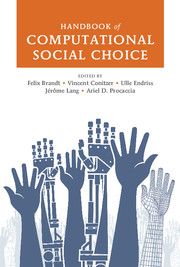15 - Hedonic Games
from Part III - Coalition Formation
Published online by Cambridge University Press: 05 May 2016
Summary
Introduction
Coalitions are a central part of economic, political, and social life, and coalition formation has been studied extensively within the mathematical social sciences. Agents (be they humans, robots, or software agents) have preferences over coalitions and, based on these preferences, it is natural to ask which coalitions are expected to form, and which coalition structures are better social outcomes. In this chapter, we consider coalition formation games with hedonic preferences, or simply hedonic games. The outcome of a coalition formation game is a partitioning of the agents into disjoint coalitions, which we will refer to synonymously as a partition or coalition structure.
The defining feature of hedonic preferences is that every agent only cares about which agents are in its coalition, but does not care how agents in other coalitions are grouped together (Drèze and Greenberg, 1980). Thus, hedonic preferences completely ignore inter-coalitional dependencies. Despite their relative simplicity, hedonic games have been used to model many interesting settings, such as research team formation (Alcalde and Revilla, 2004), scheduling group activities (Darmann et al., 2012), formation of coalition governments (Le Breton et al., 2008), clusterings in social networks (see, e.g., Aziz et al., 2014b; McSweeney et al., 2014; Olsen, 2009), and distributed task allocation for wireless agents (Saad et al., 2011).
Before we give a formal definition of a hedonic game, we give a standard hedonic game from the literature that we will use as a running example (see, e.g., Banerjee et al., 2001).
Example 15.1. The hedonic game has three agents, 1, 2, and 3, and their preferences over coalitions are as follows.
• All agents prefer coalitions of size two to coalitions of size one or three.
• All agents prefer coalitions of size one to coalitions of size three.
• Agent 1 prefers to be with agent 2 than to be with agent 3.
• Agent 2 prefers to be with agent 3 than to be with agent 1.
• Agent 3 prefers to be with agent 1 than to be with agent 2.
A coalition is as nonempty subset of {1, 2, 3}. The outcomes of the game are the partitions of the set of all agents into coalitions: {{1, 2, 3}}, {{1, 2}, {3}}, {{1, 3}, {2}}, {{2, 3}, {1}} and {{1}, {2}, {3}}. Agent 1 is indifferent between the last two outcomes, because its own coalition is the same in both.
- Type
- Chapter
- Information
- Handbook of Computational Social Choice , pp. 356 - 376Publisher: Cambridge University PressPrint publication year: 2016
- 34
- Cited by



